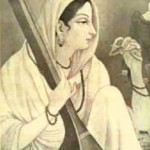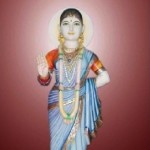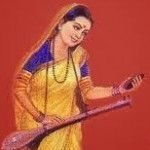Many women saints of Maharashtra, unlike Meerabai, do not declare a passionate love for Krishna, nor is there a rejection of marriage. Instead, they sing about daily the often difficult daily existence, family and chores at home, married life and finding freedom amidst it.
Until India’s Independence Dalits were not allowed to enter temples, and had to pray while standing at a distance from the threshold. Many bhakti poets, both men and women, have sung against this injustice, and, on occasion, the temple transformed into a site of miracles as obstructing statues or pillars where said to have providentially shifted to provide an unimpeded view of the deity to the ‘untouchable’ devotee.
The late Dr. Meera Kosambi argued that the greatest appeal of the Varkari movement has been its spiritual transcendence of the caste and gender hierarchies of Brahminism from which there was no escape in everyday social life. While Dr. Vidyut Bhagwat warns against essentializing the voices of saint-poets as only women’s resistance as it obscures their resistance to Brahmanical patriarchy. Since saint-poets like Soyarabai speak about their hardships of daily existence and discrimination, there is also an urge to transform the inegalitarian society. According to her, these voices of Dalit-Bahujan saints must be considered as early feminism in India. She emphasizes that these women saints were part of the early modernity of India and that their struggles and negotiations within their cultural context must be understood and reinterpreted as emancipatory cultural histories. Not only must their abhangas be considered as a source of social commentary of the times they lived in, but a precursor to the modern Dalit poetry.
 Soyarabai, a saint from the ‘untouchable’ Mahar caste in 14th century lived near the holy town of Pandharpur. She was a disciple of her husband, Chokhamela. She composed extensively, however much of it is lost; only some 62 songs are known to survive. In her abhangas she refers to herself as Chokhamela’s Mahari and accuses god of forgetting Dalits and of making life terrible for them. Her devotional songs offer sharp critiques against untouchability. She also speak about her poverty, often referring to the leftover food which were distributed among the Dalits after religious feasts. Indeed, many of her verses are concerned with the simple food she gives the god. They explicitly indicate the common understanding of the Bhakti tradition as God being both mother and father, and chanting the name of the God as the cure for the problems of the worldly life. In addition, her abhangas also deal with the sense of inaccessibility of the divine common to all saints. In one of her abhangas, she reproaches God for her status which doesn’t permit her to enter the temple. In another of her abhangas, there is a reference to Brahmins of Pandharpur harassing Chokha.
Soyarabai, a saint from the ‘untouchable’ Mahar caste in 14th century lived near the holy town of Pandharpur. She was a disciple of her husband, Chokhamela. She composed extensively, however much of it is lost; only some 62 songs are known to survive. In her abhangas she refers to herself as Chokhamela’s Mahari and accuses god of forgetting Dalits and of making life terrible for them. Her devotional songs offer sharp critiques against untouchability. She also speak about her poverty, often referring to the leftover food which were distributed among the Dalits after religious feasts. Indeed, many of her verses are concerned with the simple food she gives the god. They explicitly indicate the common understanding of the Bhakti tradition as God being both mother and father, and chanting the name of the God as the cure for the problems of the worldly life. In addition, her abhangas also deal with the sense of inaccessibility of the divine common to all saints. In one of her abhangas, she reproaches God for her status which doesn’t permit her to enter the temple. In another of her abhangas, there is a reference to Brahmins of Pandharpur harassing Chokha.
How much death, how much weeping
KITI HE MARTI, KITI HE RADTI
One colour now
AVGHA RANG EK ZHAALA
 Muktabai or Mukta was a saint in the Varkari tradition. She was born in the late 13th century to a Deshastha Brahmin family and was the younger sister of Sant Dnyaneshwar, the first Varkari saint. Forty-one abhangs are ascribed to her. In her Tatiche Abhang / The Song of The Door she prompts Dnyaneshwar about his life goal. The ancient yogi Changdev Maharaj, enlightened by her preachings, took her as his spiritual guru. Changdev Maharaj notes Muktai’s preaching in another literary work as well.
Muktabai or Mukta was a saint in the Varkari tradition. She was born in the late 13th century to a Deshastha Brahmin family and was the younger sister of Sant Dnyaneshwar, the first Varkari saint. Forty-one abhangs are ascribed to her. In her Tatiche Abhang / The Song of The Door she prompts Dnyaneshwar about his life goal. The ancient yogi Changdev Maharaj, enlightened by her preachings, took her as his spiritual guru. Changdev Maharaj notes Muktai’s preaching in another literary work as well.
On a branch of the formless
NIRGUNAACHE DAHAALI PAALNA LAAVILA
As you see it
JETHE JE PAAHE TETHE THE AAHE
 Janabai was born in the seventh or the eighth decade of the 13th century and is said to have died in 1350. The daughter of an ‘untouchable’ couple, her father took Janabai to Pandharpur where she worked as a maidservant in the household of Dāmāsheti, who was the father of the prominent Marathi bhakti poet Nāmdev. Janabai was likely a little older than Namdev, and attended to him for many years.
Janabai was born in the seventh or the eighth decade of the 13th century and is said to have died in 1350. The daughter of an ‘untouchable’ couple, her father took Janabai to Pandharpur where she worked as a maidservant in the household of Dāmāsheti, who was the father of the prominent Marathi bhakti poet Nāmdev. Janabai was likely a little older than Namdev, and attended to him for many years.
Janabai’s employers, Damasheti and his wife, Gonāi, were very religious. Through the influence of the religious environment and her innate inclination, Janabai was always an ardent devotee of Vitthal, the presiding deity of Pandarphur. Though she did not have formal schooling, she composed many excellent abhangs (अभंग) some of which are preserved alongside those of Namdev. Though the authorship of about 300 abhang is traditionally attributed to Janabai, researchers believe that many were, in fact, composited by others.
Along with Dnyāneshwar, Nāmdev, Eknāth, and Tukaram, Janabai has a revered place in the minds of Marathi-speaking Hindus who belong especially to the wārakari (वारकरी) sect in Maharashtra. In accord with a tradition in India of assigning the epithet sant (संत) to persons regarded as thoroughly saintly, all of the above religious figures including Janabai are commonly attributed that epithet in Maharashtra. Thus, Janabai is routinely referred to as Sant Janabai (संत जनाबाई).
Come, my Lady Vithabai
YEII YEII VITHABAI
Dance without stopping
HECHI DEI HRISHIKESHI
Translated from original Marathi by Jerry Pinto and Neela Bhagwat
← October 2019 Issue
This site is designed and maintained by GONECASE